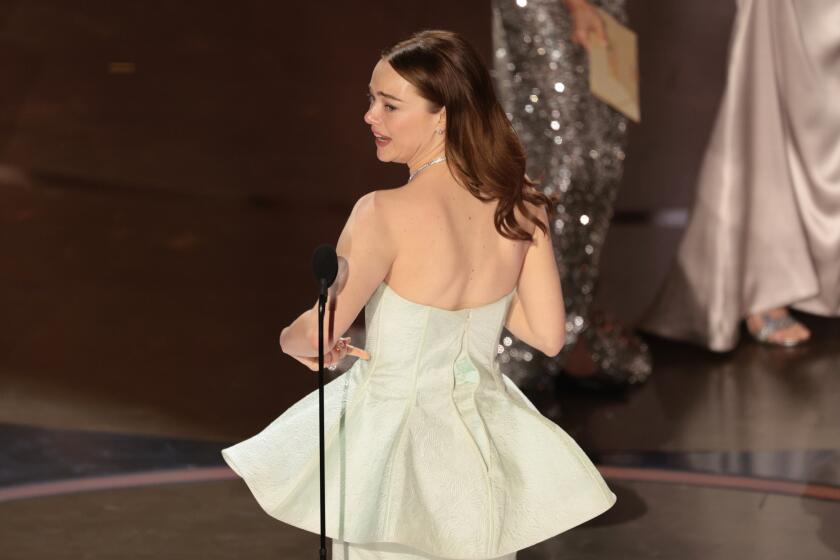Shut up or speak out at Oscars?
THE U.S. presidency has been called a bully pulpit, but it doesn’t come close to the winner’s circle at any year’s Oscars. An address from the Oval Office usually scores ratings in the single digits. But an Oscar telecast is seen by tens of millions of people around the world in mansions and in yurts.
And while even the average CNN junkie can’t tell you who the Senate majority leader is, by next Monday morning people in Turkmenistan will know this year’s best actor and who wore the glitziest gown on the red carpet.
So the temptation to plug a winner’s favorite cause often is too much to resist. Many an Oscar telecast director and academy publicist has wished they could simply eliminate politics from the show by fiat. Good luck with that one. They were the same sorts of people who thought they could control Marlon Brando on the set. (He, by the way, was one of the first to politicize the Oscars. In 1973, he sent the buckskin-clad Sacheen Littlefeather to collect his best actor award for playing Don Corleone in “The Godfather.” She didn’t have much to say about the Mafia, but she did denounce the treatment of Native Americans, which was on Brando’s mind at the time.)
To be sure, there’s lots on the minds of the celebs this year: the war, healthcare, Darfur and the small matter of electing a new president. Be prepared for lots of Obama chat on the red carpet. He’s a hotter topic than the cancellation of Vanity Fair’s post-Oscar party.
But not everyone is as entranced with the celebrities’ views as they are.
“It’s like, OK, enough already,” said cultural historian Leo Braudy, author of “The Frenzy of Renown.” “Those things turn as many people off as inspire them.”
He prefers the stars’ unguarded moments of emotion (and sometimes embarrassing bathos) to the political manifestoes. On the other hand, sometimes the political speak is genuinely effecting. What seems like a star’s self-indulgence later takes on a prophetic quality.
In his acceptance speech two years ago for his supporting role in “Good Night, and Good Luck,” actor George Clooney praised Hollywood’s penchant for speaking out.
“You know, we are a little bit out of touch in Hollywood every once in a while,” he said. “I think it’s probably a good thing. We’re the ones who talked about AIDS when it was just being whispered, and we talked about civil rights when it wasn’t really popular. And we, you know, we bring up subjects. This academy, this group of people gave Hattie McDaniel an Oscar in 1939 when blacks were still sitting in the backs of theaters. I’m proud to be a part of this academy. Proud to be part of this community, and proud to be out of touch.”
Last year, it was all about the green movement, with “An Inconvenient Truth, the documentary about Al Gore’s effort to combat global warming, winning the Oscar for best documentary. (When you arrange your mantel, do you put Oscar or the Nobel Peace Prize in the center?)
Awards to documentaries often provide a forum for political comment, and this year the five nominees in the feature doc category explore other terrifying subjects: torture, war and illness.
“No End in Sight” takes a hard look at the Iraq war, as does “Operation Homecoming.” “Taxi to the Dark Side” documents the use of torture in prisoner interrogations at the Guantanamo Bay prison camp and in Iraq and Afghanistan. “War/Dance” follows a group of children in war-torn northern Uganda, showing how they rebuild their lives through dance.
Meanwhile, Michael Moore’s “Sicko” looks at the failure of the U.S. to provide healthcare to millions of people. Count on another memorable Oscar moment if Moore gets anywhere near the mike. During his acceptance speech in 2003, after “Bowling for Columbine” won the best documentary award, Moore became one of the first celebs to take a strong stand against the war in Iraq.
“We are against this war, Mr. Bush,” Moore said. “Shame on you. And any time you got the pope and the Dixie Chicks against you, your time is up.”
Usually the audience reacts with applause. But not always.
Vanessa Redgrave, who funded and narrated a documentary film called “The Palestinian” in 1977, was aware that members of the Jewish Defense League were protesting outside the auditorium when she won best supporting actress for “Julia” a year later. She told the audience she was proud of them for not being “intimidated by the threats of a small bunch of Zionist hoodlums whose behavior is an insult to the stature of Jews all over the world and their great and heroic record of struggle against fascism and oppression.” Her remarks received boos and hisses.
Clearly perturbed, Academy Award-winning screenwriter Paddy Chayefsky decided to address the matter when he took the podium later in the telecast. He said he was “sick and tired of people exploiting the Academy Awards for the propagation of their own personal propaganda.”
He added: “A simple ‘Thank you’ would have sufficed.’ ”
--
More to Read
The biggest entertainment stories
Get our big stories about Hollywood, film, television, music, arts, culture and more right in your inbox as soon as they publish.
You may occasionally receive promotional content from the Los Angeles Times.






